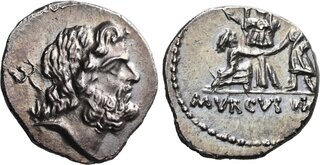| Numismatica Ars Classica > Auction 143 | Auction date: 7 May 2024 |
| Lot number: 416 Price realized: This lot is for sale in an upcoming auction - Bid on this lot  | Show similar lots on CoinArchives Find similar lots in upcoming auctions on |
| Lot description: The Dioscuri Collection. The Roman Republic. L. Staius Murcus. Denarius, mint moving with L. Staius Murcus 42-41, AR 18 mm, 3.20 g. Laureate head of Neptune r., with trident over l. shoulder. Rev. Trophy; before, male figure standing r. holding sword in l. hand and with r., raising kneeling female on l. In exergue, MVRCVS IMP. Babelon Statia 1. Sydenham 1315. Sear Imperators 337. RBW 1782. Crawford 510/1. Extremely rare and in exceptional condition for the issue. Struck on an unusually fresh metal and with a pleasant dark tone. Reverse slightly off-centre, otherwise extremely fine Ex 51 Gallery sale April 2015, 70. The career of Lucius Staius Murcus, like that of so many commanders of the Imperatorial age, is not well documented. He seems to have been one of the more gifted military minds of his age, and it is clear from coinage that he was hailed Imperator, though the occasion is not recorded. Equally elusive are the circumstances under which he struck his coins, all of which provide ample ground for speculation. According to Appian, Murcus did not participate in the murder of Julius Caesar, whom he had served as a legate, yet he was at that meeting where Caesar was killed and was among the first to raise their swords in defence of the assassins. Soon afterward, Murcus went to Syria as the designated proconsul of 44 B.C. He brought with him three legions to restore order in the wake of a rebellion that had broken among the Syrian army under the leadership of the ex-Pompeian Q. Caecilius Bassus. Accounts vary, but it would appear that Murcus and the governor of Bithynia, Q. Marcius Crispus, joined forces to besiege Bassus in the stronghold of Apameia. The stalemate was resolved only when Cassius – who, with Brutus, was now preparing for war against the Caesarians – negotiated to acquire all of the legions for his Republican cause: three each from Murcus and Crispus, and one or two from Bassus. In return for his legions and his change of loyalty, Murcus received a command position in Cassius' fleet. Murcus may have taken part in the infamous siege of Rhodes in the spring of 42, and soon afterward was entrusted with an important mission. He sailed with a large force to the southern tip of the Peloponnesus, where he was to intercept a fleet that Queen Cleopatra VII was leading westward to aid Antony and Octavian. But the two forces never met, as most of Cleopatra's fleet was destroyed in a gale, and Murcus could do little more than survey the wreckage. His original mission now scrapped, Murcus engaged in some looting in the Peloponnesus before sailing further westward to the Italian port of Brundisium, where he began to blockade Antony's effort to transport troops and supplies to Macedon. He performed well against the under-supplied Antony until Octavian arrived with ships from Sicily. Thereafter, a great many vessels slipped through and Murcus' efforts were of little value until Cassius reinforced him with a fleet of warships and auxiliary vessels under the command of Ahenobarbus. The enlarged blockade proved effective, and remained in force until the Battle of Philippi. Indeed, on the very day of the battle, Murcus and Ahenobarbus had their greatest success by intercepting a transport of soldiers and supplies under the command of Calvinus. The loss of those Caesarean reinforcements – on the day their comrades had triumphed at Philippi – was disheartening; many vessels and seasoned soldiers were lost in the Adriatic. After learning that Brutus and Cassius were dead, and their armies defeated, Murcus and some Republican refugees gathered and eventually sailed westward to Sicily to join the ranks of Sextus Pompey. In doing so, he greatly enlarged the number of ships and soldiers at the rebel's disposal, and added a substantial sum of money to his coffers. It was perhaps in this period of uncertainty between Philippi and his joining Pompey, when Murcus was commander of a fleet without a cause, that he struck his denarii. If we subscribe to Appian's view, the loyalty and support of Murcus was rewarded only by Pompey's growing suspicion and envy. It is equally likely that Murcus demanded to play a more prominent role in affairs, and that Pompey feared the consequences of sharing that much authority. In either case, it appears that Pompey began to suspect his comrade's motives, and isolated him from command decisions so plainly that by 39 an irreparable rift had developed. When Murcus took a leave of absence to Syracuse that same year he was murdered by men in the service of Pompey. Estimate: 6000 CHF |  |



